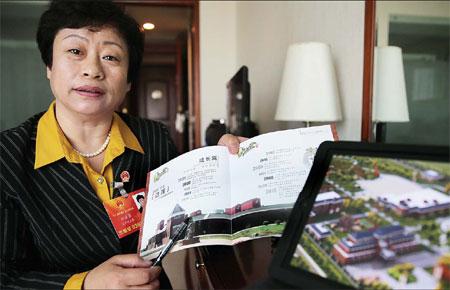Newcomers get chance to shine under NPC spotlight
Updated: 2013-03-04 07:47
By Zhao Yinan and Cui Jia (China Daily)
|
||||||||
|
Liu Qinglian, a deputy at the 12th National People's Congress from Liaoning delegation, has prepared a motion calling for an insurance program for sea farmers. Xu Jingxing / China Daily |
|
Rehangul Yimir, a 24-year-old NPC deputy from the Xinjiang Uygur autonomous region, talks with a colleague about the motion she will present at the NPC session which begins on Tuesday. Her proposal was translated into mandarin from the Uygur language with the aid of an electronic translator (below). Photos by Cui Jia / China Daily |


Deputies attending first congress ready for challenge to live up to people's expectations, report Zhao Yinan and Cui Jia in Beijing.
Liu Qinglian is looking forward to the upcoming National People's Congress. The 52-year-old from Jinzhou in Liaoning province will present a motion worth13 million yuan ($2.10 million) on behalf of her fellow workers who earn their money breeding sea cucumbers, a traditional delicacy.
As Jinzhou's first NPC aquaculturist deputy, Liu knows her peers will be watching her performance closely as she attempts to push through her proposal, which calls on the government to establish an insurance program for sea farmers.
On Sunday, two days before the session begins, Liu and a number of other lawmakers from the area caught a flight to Beijing. For Liu, the prospect of attending the meeting of the nation's top legislative body is both daunting and exhilarating as she contemplates playing a role she had never contemplated before: submitting motions, choosing State leaders and discussing major political issues, including government restructuring.
The 12th NPC will be notable for a number of changes from previous meetings. The number of grassroots worker representatives has risen while the number of seats held by officials has fallen. The change emphasizes the efforts the body has made during the past five years to promote greater public involvement, according to experts.
At least 401 workers and farmers, including farmers-turned-migrant workers, have been elected as deputies to the congress for the next five years. They account for 13.42 percent of the 2,987 newly elected lawmakers, an increase of 5.18 percentage points from the 2008 legislature, according to Xinhua News Agency.
The increase in the number of grassroots voices means that less than 35 percent of the deputies are government and Party officials, a reduction of 7 percentage points from 2008. As a result, 210 seats previously held by officials will be taken by deputies selected from the general public.
Wang Wanbin, deputy chairman of the NPC Standing Committee, said the new deputies come from a wide range of backgrounds and the move has been "highly popular with the public".
The night before Liu arrived in Beijing, she spent time finalizing the wording of her motion. Her call for the insurance program has its origin in two devastating episodes from her decade in the aquaculture industry that cost her an estimated 13 million yuan ($2 million).
The first incident occurred in 2003 when Liu had just started her business on Jinzhou's long mud flats, a far from ideal environment for raising sea cucumbers. "A management error resulted in all the sea cucumber larvae being destroyed in a single night. It was so bad that at times I thought I would never be able to make a comeback, let alone repay my loans," she said.
The second blow was equally devastating. In 2009, when "about 40 percent of the Bohai Sea had frozen", Jinzhou and a number of neighboring cities faced the worst sea ice in three decades. The water froze a month earlier than usual, posing a severe danger shipping and the fishermen's livelihoods, and an intense cold front arrived overnight.
"The memories are still vivid. It was the morning of Oct 14. We went out to pick the mature sea cucumbers, but they were all limp and lifeless," she said. "We had never had an experience like that before and nobody knew how to deal with it. We lost sea cucumbers worth 10 million yuan," said Liu, whose trade is notoriously "high risk, high reward".
"Sea farming relies heavily on good natural conditions. If disaster strikes, there's very little the farmers can do to recover their outlay," she said.
When the NPC ends and Liu returns home to Jinzhou, she plans to visit four neighboring coastal cities to collect more information and refine her motion ready for the NPC's 2014 session. She acknowledged that many officials and technical experts have indicated their support for the future of the aquatic farming industry, but feels that her first-hand knowledge will be invaluable. "I know more about the situation on the ground than they do, so it's easier for me to pass on the message from the grassroots to the decision makers," she said.
Field research
Rehangul Yimir unraveled a crumpled sheet of paper to display the motion she will submit to the upcoming session. Although the handwritten proposal, covering both sides of the paper, looked rather like a primary school student's homework, it's the outcome of field research conducted by the young woman from the Kizilsu Kirghiz autonomous prefecture in the south of the Xinjiang Uygur autonomous region.
At 24, Rehangul Yimir is the youngest deputy in the Xinjiang delegation. She admitted that when elected, she had little idea of her responsibilities and rights as a lawmaker and she confessed that initially she thought the State leaders wouldn't listen to her.
"But the teachers at the NPC training classes provided by the county and prefecture congresses assured me that my opinions will be considered," she said.
Many of Xinjiang's newly elected lawmakers are first-time NPC deputies. To smooth their entry into the legislative body, they gathered in Urumqi, capital of Xinjiang, to attend a three-day training course. There, the deputies gained general information about their home region, including population figures, economic growth data, annual revenues and the surplus of rural labor. The class also explained the role of the NPC and the decision-making process.
After the course, the young deputy decided to travel 500 kilometers from her hometown in Akto county seat and visit pastureland located at an altitude of 3,800 meters.
"There are things that you would never think of, if you didn't go and see for yourself," she said.
The isolation means that the cost of living in the mountainous area is far higher than on the plains below. Rehangul filled three notebooks with descriptions of the things she saw and heard in the village.
"A brick sells at 2 yuan in the rural area, 10 times more than in my county seat. And the cost of building a house can be as much as 2,100 yuan per square meter, that's three times higher than at our place. I wondered when I was speaking with the herdsmen if it would be possible for the government to provide subsidies for them."
Although she has worked at a textile factory in coastal Zhejiang province since 2007, the young woman still finds it difficult to speak mandarin. The motion she will propose at the NPC was written first in the Uygur ethnic language and then painstakingly translated into mandarin with the aid of an electronic translator.
Rehangul is planning to conduct more research during the coming 12 months to help her better perform her duties. "I have an inherent advantage as a grassroots deputy. There are some things that the public doesn't like to tell the officials," she said.
Preparation
Five years ago, Hu Xiaoyan, Zhu Xueqin and Kang Houming made headlines by becoming the first migrant workers to be elected as NPC deputies. Each of them represented more than 80 million migrant workers and, as deputies, they were elected to provide a voice for those who have made a major contribution to China's dynamic economic growth, but have somehow been left behind in the process. Zhu has been re-elected for this year's congress.
Han Dayuan, a law professor at Renmin University of China, said the changes to the NPC framework will contribute to rural-urban integration and encourage farmers to participate in political events.
"It may also help push forward reform of the hukou," he added, referring to China's household registration system, which can often put migrant workers at a disadvantage when attempting to secure health services or education for their children.
Chen Weilan, a former vice-president of the Chinese Academy of Governance, said she hoped the newly elected grassroots deputies will not be overcautious or crippled by nerves, and will feel confident about speaking out.
"They might not be familiar with political issues in daily life, but they can prepare thoroughly by taking classes or reading books before the session begins to better perform their duties at the meeting."
Contact the writers at zhaoyinan@chinadaily.com.cn and cuijia@chinadaily.com.cn



(China Daily 03/04/2013 page6)

 In Photos: 7.0-magnitude quake hits Sichuan
In Photos: 7.0-magnitude quake hits Sichuan
 Li Na on Time cover, makes influential 100 list
Li Na on Time cover, makes influential 100 list
 FBI releases photos of 2 Boston bombings suspects
FBI releases photos of 2 Boston bombings suspects
 World's wackiest hairstyles
World's wackiest hairstyles
 Sandstorms strike Northwest China
Sandstorms strike Northwest China
 Never-seen photos of Madonna on display
Never-seen photos of Madonna on display
 H7N9 outbreak linked to waterfowl migration
H7N9 outbreak linked to waterfowl migration
 Dozens feared dead in Texas plant blast
Dozens feared dead in Texas plant blast
Most Viewed
Editor's Picks

|

|

|

|

|

|
Today's Top News
Live report: 7.0-magnitude quake hits Sichuan, heavy casualties feared
Boston suspect cornered on boat
Cross-talk artist helps to spread the word
'Green' awareness levels drop in Beijing
Palace Museum spruces up
First couple on Time's list of most influential
H7N9 flu transmission studied
Trading channels 'need to broaden'
US Weekly

|

|









